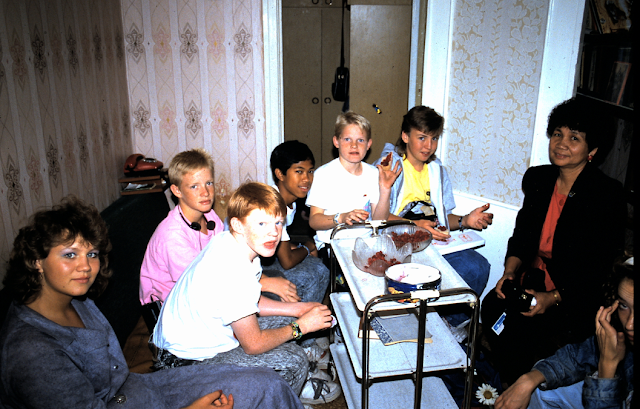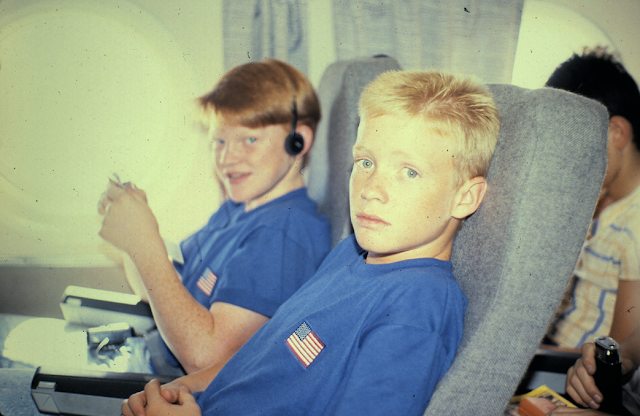Our Trip to the Soviet Space Camp. Summer 1989
Part 3
Half way through the three week camp, the camp staff asked if Mila and I would put together an America Day for the 300 children and teens attending the camp. Our delegation, with the help of our new found Bulgarian friends, prepared large banners announcing "America Day" and the activities we had planned.
A Skit we Performed During America Day
I'm teaching the lesson on America Day
We arranged a special meal for America Day's supper. A few days before the camp Mila met with the camp's head cook. She explained french fries. The cook seemed to understand. She explained what a hamburger was. The cook seemed to understand. She explained that we needed mustard and ketchup. The cook seemed to understand. "Seemed" is what I counted on. Something got lost in the translation.

Our American Delegation to the Camp.
Kyle Sanderson, Rocky Smart, Me, Rangi Smart, Mila and Mila's two boys from
Northwest Middle School in Salt Lake
The camp's music teacher asked me to provide the music for America Day's evening disco. There was dancing every night during the camp. That afternoon Rangi, Rocky, Kyle and I went through our cassette tapes looking for danceable songs.

We were featured in the city newspaper.
The camp square was full. Everyone, including people not a part of the camp, had come to hear our forbidden western music. I sat on the stage and cued the music before handing the tape to the DJ for playing. It was fun to see the faces of hundreds and hundreds of young Soviet children hearing America's top 40 hits for the first time over the camp's impressive sound system. Many stopped dancing so they could focus on the songs themselves. Afterwords, the DJ asked if he could borrow the tapes for copies. I'll bet he made a handsome side income selling black market copies of our tapes.
We were allowed to go into Novosibirsk twice during our stay. The boys saw what life was like for the average Soviet citizen in Novosibirsk. We saw long lines to buy vodka, clothes, food, etc. We saw lines where the people in the line didn't even know why they were in line. They just knew something good was about to be made available for purchase. Rumors dictated your day's shopping. Women would hear a rumor that state store whatever would have a shipment of meat at 4:00 P.M. The line at the store would form at daybreak. Sometimes the rumors were true, other times they weren't - or the shipment just didn't arrive.

Discussing shopping with the Camp's English Teacher
Later that afternoon the translator had me conduct a shopping demonstration for the boys.
"Now you see how we shop," she said in her faulty English. "You go stand over by that glass counter. You see there is nobody there. Pretend to be looking at something interesting."
"What will happen?" I asked.
"You will see," she answered.
I walked over to a fairly empty part of the department store. I stopped at a glass case and pretended to be looking at something in the case. Within seconds a crowd had gathered. People were pushing and shoving to get up to the glass to see what it was I was looking at.
We were invited to the apartment of the camp's English teacher on our second trip to the city. We talked about life in the Soviet Union in her small cramped living room. She served fresh raspberries and cream. I knew it was a special treat. I knew how difficult it was to find fresh anything. Her family had gone out of the way to make us feel welcome.
Pictures at the two War Memorials
We visited two Soviet war memorials during our two excursions into the city. Twenty-five million Russians lost their lives in World War 2. We saw several newly married couples placing flowers on the memorials, customary at that time.
At my request, we stopped at one of the few functioning churches in the city. The Russian Orthodox Church was beautiful. We entered the church and found the priests performing two marriages. Church weddings were rarely done in the USSR at that time.
The Russian children stayed in the buses and waited. They were either uninterested in religion or fearful of their camp leaders. Our Bulgarian friends came with us even though Bulgaria was an athiest Communist country at the time, and Stan's father was Communist Party official. It was the first time either boy had ever been inside a church. They asked about the cross and wanted to know why a man was nailed to it.
Our boys learned to appreciate their own country and our lifestyle. They learned to appreciate the basics of life like toilet paper, soap, shampoo, toiletries, cars, full supermarkets, decent housing, etc.

A typical gathering outside our Dorm wanting to talk America, religion, politics etc.
The boy I'm talking to was nicknamed 'blue eyes'. He spoke the best English of the teens and
acted as their translator.
Rocky on the day of departure. He is saying goodbye to his Russian friends.
He is wearing the red neckerchief of the Young Pioneers given to him by a friend.
"You Christian. Me Christian," she whispered. I got on the bus and unwrapped the gift. It was a home made Russian religious icon of Mary and Jesus. It hangs on my living room wall today.
Many campers ran up to touch the bus as it pulled away. They tried to catch a last glimpse of their American friends.
These were some of the children in our class group.
We left the camp on August 14th. Our bouncy bus took us back to the MIG fighter jet plant for the flight back to Moscow. The plane was scheduled to leave at 2:00 P.M. At 3:00 P.M. when we were told that due to heavy fog in Moscow, the plane would be delayed until 5:00 P.M.
They let us exit the plane to stretch our legs with a warning not venture off. Armed soldiers kept a close eye on us. The boys found a ball and played soccer and basketball. Rocky acted as the basket. The boys entertained us while we waited and waited.
At 5:00 P.M. they extended the delay to 8:00 P.M. At 8:00 P.M. they told us the flight was canceled. We spent the night in Novosibirsk at a hostel used by the MIG plant employees. It was rough sleeping. There were ten or so of us in every room. It was like sleeping in a homeless shelter.
We left Novosibirsk the following morning at 9:00 A.M. We landed in Moscow at the same time due to the four hour time difference. We waited three hours for our bus to take us into the city. It arrived, we got on board. Ten minutes later it broke down on the highway into Moscow. We sat on the roadside for a few hours and waited for another bus to come fetch us. We were loosing precious Moscow sightseeing time.
The following day we toured Moscow. We saw the Moscow circus, Red Square, and Star City - the place where Soviet Cosmonauts are trained.
We left Moscow on August 17. Our Lufthansa flight had mechanical problems which delayed our departure from Moscow for two hours. It was blessing in disguise. Because of the delay, we were upgraded to business class for the flight to Frankfurt. We enjoyed the extra benefits of business class.
We had several hours in Frankfurt, Germany before our next flight to New York. We spent the time sightseeing.
We discovered our luggage was lost again (because of the delay in Moscow) when we landed in New York. I had to go through the hassle of filling out the lost baggage forms again. Because of the delay in Germany, we lost our connecting flight to Salt Lake and spent the night in New York City. The boys phoned home. There were tears. The boys weren't able to call home during our time in Russia. The camp had one telephone in the camp director's office. He tried, but couldn't get a call placed through to America. Such calls had to go through the central telephone exchange in Moscow - making it almost impossible.

We arrived home on August 19. Our luggage was waiting for us. It was a trip of a lifetime but we were glad to get home.
My Photographs of the Trip:
 |
| The Flag Ceremony in the Camp Square at our arrival |
 |
| The Boys waiting through the ceremony. |
 |
| We are officially welcomed to the camp. |
 |
| The Young Pioneer Banner |
 |
| Rocky holding the Young Pioneer Banner |
 |
| The boys getting a tour of a Soviet helicopter |
 |
| Rocky in a Soviet Cosmonaut suit |
 |
| The boys on the camp podium. |
 |
| Kyle, Rocky and Rangi |
 |
| The boys on the camp's playground |
 |
| A late night game of chess in the dorm |
 |
| America Day skit |
 |
| The boys in one of the space lessons |
 |
| The boys learning how to make a model rocket from scratch |
 |
| Forming the nose cone |
 |
| Our room at the end of a day. The man is the leader of the Dutch delegation (himself and his daughter). |
 |
| The boys take a break from soccer for a picture |
 |
| A birthday celebration for the leader of the Dutch team |
 |
| Working on one of the America Day banners. |
 |
| One of our translators showing her internal passport necessary to travel within the USSR |
 |
| The boys at a hydroelectric plant. |
 |
| The boys at a fruit juice vending machine. You put in your coin and filled the glass glass. You had to rinse the glass out when you were done for the next person. |
 |
| Lunch during one of our city outings. |
 |
| Our stop at the Russian Orthodox Church |
 |
| America Day supper |
 |
| Our McDonald's Sign and the young Russian waiters |
 |
| A day on the lake |
 |
| Getting them to stay awake during the lectures was impossible |
 |
| Shopping in the city |
 |
| Our visit to the English teacher's apartment. This was their living room. |
 |
| The sign at the front of the camp. |
 |
| Svet's turn to wear American clothes |
 |
| Rocky letting one of his new Russian Friends try his clothes and shoes. |
 |
| The boys hated buckwheat. |
 |
| Friends in the dorms |
 |
| Our field trip bus |
 |
| Broken down on the road to Moscow. |
 |
| The boys in front of Lenin's Tomb |
 |
| The boys on Red Square |
 |
| The boys at Star City |
 |
| Our return to Salt Lake City |






























